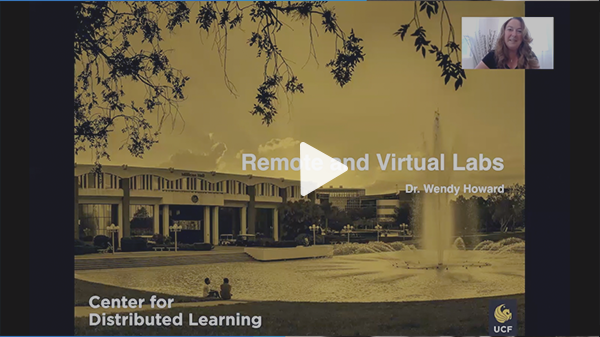Bringing TOPkit Digest to You
|
|
Contents of this Digest:
- Video Tip: Shifting to Remote and Virtual Labs
- Announcements: TOPkit Workshop 2021 and Innovation Summit 2021
- Top Tips: Virtual Labs: Collaborate, Innovate, Adapt
- From the Community: Universities Respond to Covid-19 by Moving to Online/Remote Labs Resources
- Top Community Topics
|
|
VIDEO TIP
|
Quickly Shifting to Remote and Virtual Labs
|
|

|
|
Dr. Wendy Howard, Program Director of the Pegasus Innovation Lab for Digital Learning, describes UCF’s response to support faculty who teach STEM lab courses when they quickly shifted to remote instruction due to the COVID-19 pandemic.
|
|
MUST-READ ANNOUNCEMENTS
- Hold the date for the interactive, engaging TOPkit Workshop 2021 to occur on Thursday, March 25th and Friday, March 26th.
- Save the Date for the Innovation Summit 2021. This will be a live virtual event planned for Tuesday, March 23rd and Wednesday, March 24th.
|
|
TOP TIPS
|
Virtual Labs: Collaborate, Innovate, Adapt
|
|
|
While the sudden move to remote instruction was smooth for some courses, others, like those with hands-on labs, were left in a bind as they struggled to bring what would happen in person in a lab to the virtual realm. As we navigate the future of online and remote education, finding ways to support faculty with labs has become part of the new normal. Here are eight tips to help faculty members move their labs online and continue to provide students with quality instruction.
|
|
|
|
|
|
|
|
|
#1 - You are not alone. Reach out to your campus support and resource teams such as your LMS admins, librarians/learning resource specialists, technology training team, [etc]. They will know of current tools in use, help vet new tools, and connect you with content for your lab.
|
|
#2 - Remember your professional organizations. Some of these organizations have resources and simulations that may be useful.
|
|
#3 - It doesn’t just impact your class; it provides an opportunity for career readiness. Professional labs are also working to make their labs smart and/or virtual. Students having access to virtual labs such as JoVE, Labster, or Visible Body could help prepare them for future work. | |
#4 - Coming together on common goals can build community. There is no doubt a shutdown can make faculty feel isolated and alone in their challenges! Consider using your online meeting platform of choice to bring faculty together to discuss their challenges and ideas in finding solutions. #5 - Empower and support a community of practice. Bringing together multidiscipline subject matter experts, practitioners, and learning designers to discuss instructional challenges and collaborate on solutions can be done quickly and effectively.
#6 - Be stubborn about your learning objective. At the forefront of most professors’ minds is that the content needs to match the content of the learning objectives. With so many possibilities (videos, virtual labs, and take-home labs), the level of the lab should also meet the level of the learning objective. There are many great options out there, it’s just a matter of finding the right ones that meet your specific learning objectives.
#7 - …and be flexible on everything else. Things do not always run perfectly smoothly in the lab, so why would they at home? When possible, you may want to provide your students (and yourself) with contingency plans, grace, options, and flexibility. Being nimble and flexible is more important than being perfect.
#8 - Sometimes less [tech] is more. Chances are you have in-person faculty who are less comfortable with technology. Focus on learning objectives and outcomes, then look for simple ways to accomplish those objectives using tools they prefer.
Thank you to Bryan Biggers (Palm Beach Atlantic University), Christine Brown (University of South Florida), Debra Sheridan-Brinkman (Miami Dade College), and Vicki Westergard (St. Petersburg College) for the above tips. They presented at the FLVC-IDN Webinar on Strategies for Online and Remote Lab Courses. To learn additional strategies, please view the recorded webinar.
|
|
FROM THE COMMUNITY
|
Universities Respond to COVID-19 by Moving to Online/Remote Labs Resources
|
|
|
The rapid response to moving hands-on labs to online/remote labs affected universities and colleges throughout the US. To better serve their faculty members, websites were designed to provide resources and links ranging from videos, demonstrations, lab kits, etc. to aid in instruction. Sourcing material and determining the needs of your faculty members will help decide what works best for your institution. Although some instructional content is provided at no cost, others require a license for student access.
The TOPkit.org community post includes examples of how different universities provide resources for online/remote labs to their faculty members.
|
|
Content Coordinator and Contributor
Wendy Howard, Ed.D., Program Director, Pegasus Innovation Lab, Center for Distributed Learning, University of Central Florida
Editors
Bren Bedford, MNM, Web Project Analyst, Center for Distributed Learning, University of Central Florida
Samantha Richardson, B.A. English, Communications Specialist, Pegasus Innovation Lab, Center for Distributed Learning, University of Central Florida
|
|
|